Text
we ask that the defense not say "me when i lie" while the witness testifies
76K notes
·
View notes
Text
Check out this CD I burned. (Puts it in my car radio and plays it and it's just a medium quality recording of you coughing)
10K notes
·
View notes
Text
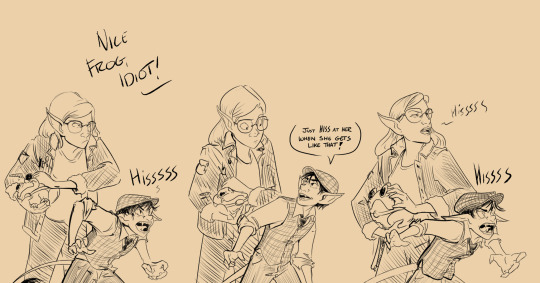
Feel like drawing again for the first time in awhile because I started Fantasy High and I love it so much. Riz is a character practically made for me.
So, have a scribble of one of my favorite Riz and Adaine moments
2K notes
·
View notes
Text
Brennan keeps going back to riz as every prominent adult in his life like PLEASE open up about your trauma PLEASE open up about your trauma PLEASE ope-
823 notes
·
View notes
Text
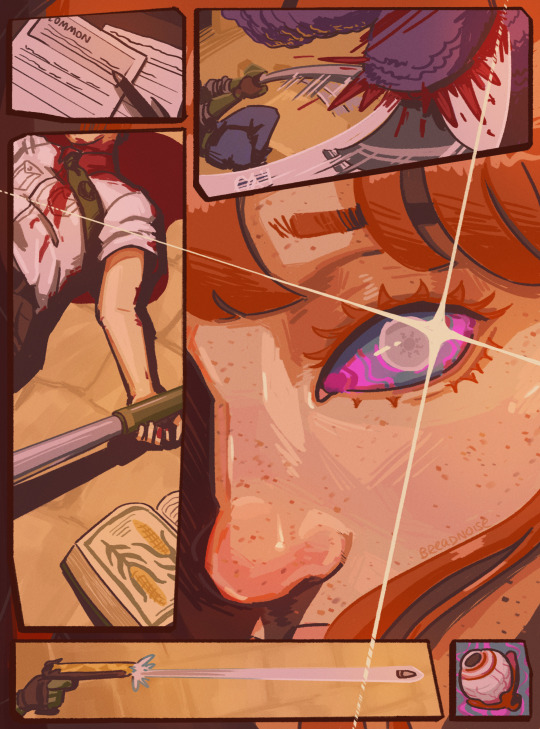
the last stand
8K notes
·
View notes
Text
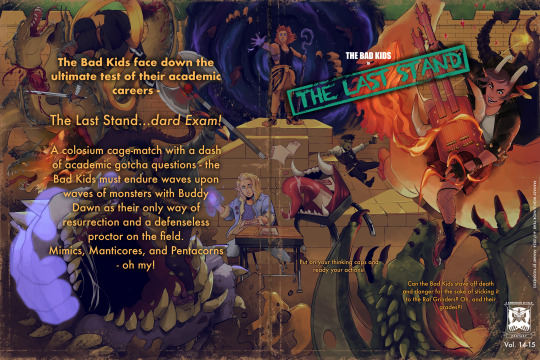

They optimized the hell out of that fight. Well done intrepid heroes!
3K notes
·
View notes
Text
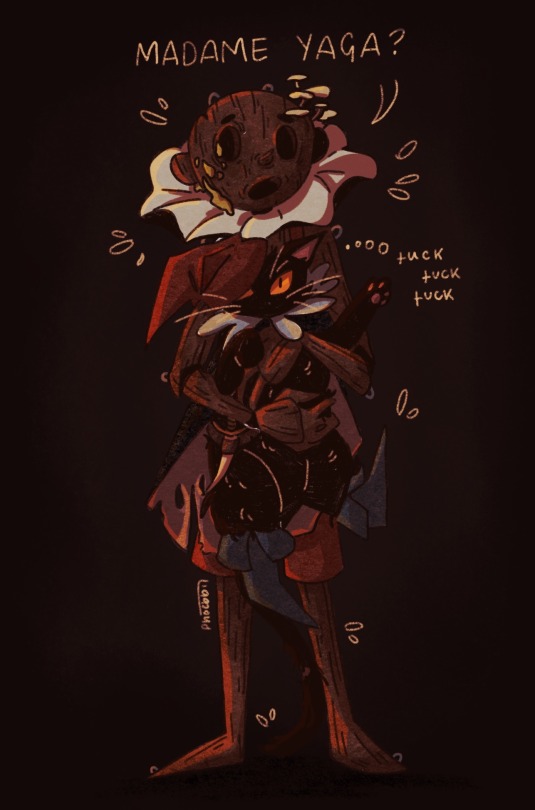
‘I put my hat on Pib’
984 notes
·
View notes
Text
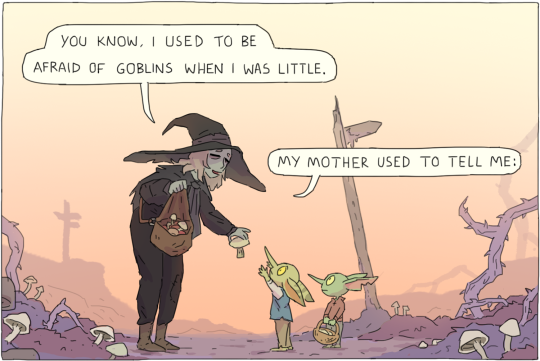
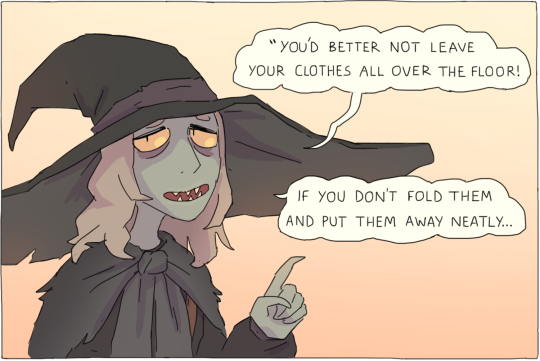

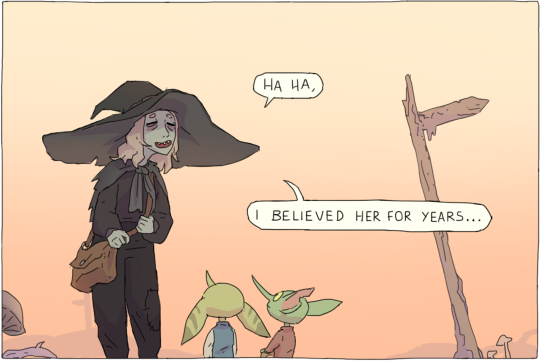
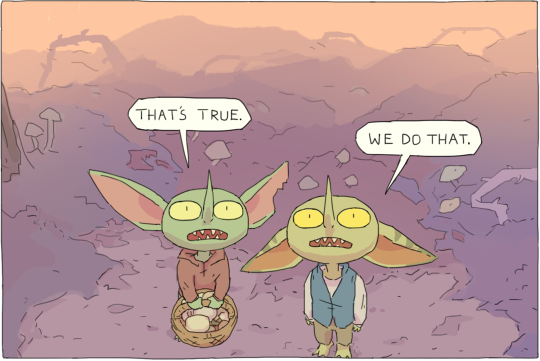
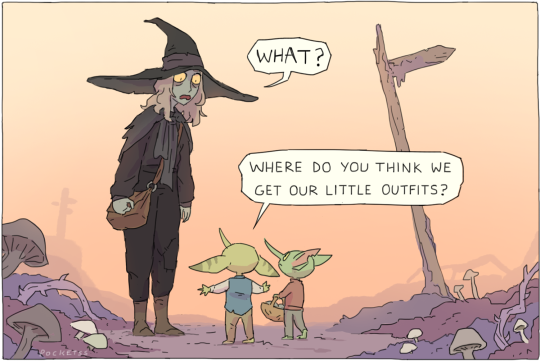
leave your laundry on the floor for them
142K notes
·
View notes
Text
i guess an issue with "anonymized people of the global south" (truly a phrase that keeps on giving) is that it is perhaps true that there is a hypothetical limit to what any given people can care about. geography, race, politics and shared cultural factors such as religion and language certainly play a role in what people necessarily care about, and also what the scope of that care entails. like most decent people feel a sense of empathy and sympathy towards a beseiged or starving population in any situation, and may even be moved to donate to them or learn more about them or raise money and/or campaign for them even if there is no pressing political need to do so (remember #stopkony?)
but the issue with american politics is that it isn't a matter of caring due to some abstract moral or virtuous show of solidarity. it is not a matter of progressives or leftists showing empathy and extending solidarity to a cause based on personal interest or inclination.
the US is in the unique position of being directly involved in (almost) every single major conflict in the world due to its self-assigned role as the "global police" (or the leader of the free world, or in short: imperialism) and a self-styled democracy, unlike other empires and other aspiring empires, like russia and the UAE, whose citizens do not live in a democracy. so this leaves us in the uncomfortable position of begging for attention from people whose votes are directly responsible for our lives, when they should have already been paying attention before they voted.
it is us asking you for accountability, being reframed as asking for sympathy. whatever you fear from trump you have already visited tenfold upon the middle east under obama, under trump, under biden.
this is not abstract or metaphorical, it's quite direct. american politics are bipartisan when it comes to horrific foreign policy and the US war machine is also bipartisan. the middle east in particular has seen the impact of these policies intimately and violently.
in a hundred years' war on palestine rashid khalidi makes the case that because so many zionists were american by birth and had close connections with the US, they were far more fortunate in the exchange of power that happened post-1948, from britain to the US. meanwhile palestinians had absolutely no familiarity with the US or its lobbying system, having been colonized by the english and more familiar with the british imperial system as opposed to the newfound american one.
this led to palestinians being marginalized from the mainstream they needed the most to make their case, and over the next few decades seeing successive political and human losses as israel took its role as an american outpost in the middle east, and the UN acquisced to US influence again and again and again, culminating in the situation we have today: a right-wing israeli government with no chains, a genocide, and a second nakba.
the point is that we don't ask for american sympathy for an anonymized people of the global south for proof of moral fibre. it's not a request to show your ability to be human and show empathy. it is not a request to show superhuman virtue and put another people's welfare above your own. rather, its a demand to look at the full spectrum of your pre-existing political involvement, as a citizen of a supposed democracy that is directly responsible for the enormous devastation on hand. it is a matter of staying informed because your ignorance is killing us, our friends, our neighbors, and the disregard for the so-called rules-based world order has become insurmountable.
people have more or less sucked it up and accepted this reality across the board. nobody is pretending we don't know we are an anonymized people of the global south, we are simply dealing with the consequences of that reality. today that means playing ball in the attention economy, it means campaigns and hashtags and a war of narratives and humanizing and normalizing and organizing, all of this ultimately to de-anonymize the people of the global south for you, because they are already de-anonymized to the bombs and soldiers subsidized with your taxes and your UN veto.
302 notes
·
View notes
Text
[ID: Images of book pages, taken from throughout the book Organization Means Commitment by Grace Lee Boggs. Some sections are underlined and some notes are visible in the margins. End ID].
Image One Transcript:
A heading in all capitals: The American Political Background.
The difficulty in understanding the role of the revolutionary cadre organization does not stem from any intrinsic mystery in this role. Rather, it stems from the lack of experience of Americans in the political process of continuing commitment to the kind of systematic, collective, dialectical, theoretical and practical struggle which is at the heart of a revolutionary cadre organization. For historical reasons, the approach of most Americans to social has always been a pragmatic or problem-solving approach which is essentially anti-intellectual. In what has been described as the “headache syndrome,” they react to and try to resolve each problem it arises, as if each were a sporadic, isolated or accidental problem in a system which is fundamentally sound, and therefore capable of quick and easy solutions.
In the recent period, confidence in the soundness of American institutions has plummeted, chiefly under the impact of the revolutionary struggles of Vietnamese people and the revolt of blacks. The result is that a great many Americans, black and white, no longer think of American problems as isolated or accidental. They have traced their roots to the “system” of “capitalism and racism” and concluded that a revolution is necessary in the US. They have further identified the chief revolutionary social forces to make this revolution as the blacks and other non-white (so-called) minorities.
End Image One Transcript.
Image Two Transcript:
Radicalized by these methods young Americans, particularly young black Americans, exploded in the streets of practically every major city in the country, creating by the late 60’s a social crisis of unprecedented magnitude with the entire society.
However, while the social crisis was obviously maturing, no cadre organization was being created to evaluate the new reality and to give direction to the emerging social forces. The result is that today the great majority of Americans, both those who feel oppressed by the system and those who support the system because of the benefits they have received from it, are completely bewildered.
They feel as if they were being tossed about in the eye of a great storm with no idea where they should go or how to get there. Likewise, in the absence of a revolutionary cadre organization, most young people who played such an important role in creating the movement of the 60's have been without any framework within which they could collectively evaluate the situation and make new projections to the country, let alone transform themselves into more responsible, more conscious, more dedicated and more critical cadres.
Left to their own individual devices, the great majority of them have drifted out of the movement or have gone the way of left or right opportunism. This is to say, many have become pure adventurists, making isolated and desperate attacks on the power structure or anyone who they think supports the power structure. Others have become careerists, “on the go” in one way or another, as consultants, project directors, or staff persons supported by federal, city and state agencies and by churches and universities in order to co-opt the "heavies" of the movement.
End Image Two Transcript.
Image Three Transcript:
The decision by a group of people, no matter how few, to commit themselves to this collective and protracted struggle and to reject “on the go” politics, shapes everything that follows. If their commitment is to become more than rhetorical “testifying,” they must now embark on the concrete steps necessary to create a collectivity out of their separate selves. As it is, they are still individuals, with their own very different ideas about what is and what should be, what they should do and how they should do it, what they can expect from each other now and what they should be able to expect from each other as they begin to struggle together.
End Image Three Transcript.
Image Four Transcript:
Few of these, if any, have ever sat down to work out a program that a half dozen people could carry out over the period of a year in order to build themselves into a viable organization with their own collective identity and specific contribution to make to the overall movement. Most of the so-called revolutionaries in the US can rap about the need for a planned economy or for the reorganization of the entire united stales from top to bottom. But they never have taken the time to think through the program for even a small cadre organization: a clear conception of the purposes the group is trying to achieve, the methods by which they propose to achieve these purposes, a proposed time schedule, including deadlines for each step of the program, and the specific step-by-step processes.
When an organization works out clearly such programs, it also establishes a basis for the evaluation of its programs. Thereby it does one of the most important, yet deceptively simple, things that a revolutionary cadre organization can do: learn from experience or develop its theory from social practice. Nowhere more than in the US is it so necessary to recognize and emphasize the importance of learning and the development of theory through a continuing relationship of your theory to practice.
This is the only way to combat the powerful tendencies in this country to empty rhetoric (or talk without practice), and mindless activism or reactionary militancy, i.e., militancy to prove one's militancy or because it is fashionable to be militant, rather than to act because one has some deeply felt convictions about the way man/womankind can and should advance, and realizes that these convictions can only be tested in social practice.
End Image Four Transcript.
Image Five Transcript:
Since the 60's, on the other hand, thousands of young people have been attracted to the new political organizations of all persuasions, ready to drift into (and out of) these organizations with the same lack of commitment as they have given to ad hoc organizations, particularly if the mass media has given these organizations any publicity. In turn, these organizations, living for the moment and for the spotlight, have recruited furiously in order to give the impression of a large public following.
In the recent past we have had some instructive experiences with organizations who have expanded rapidly for the sake of and with the help of the media. Often they have discovered that they were recruiting many police agents. Even when this was not the case, they have still been at the mercy of their new members, most of who were attracted to the organization in the first place by the image of confrontation which they got from the mass media and who have therefore led the organization into confrontation after confrontation, until its entire energies and resources were exhausted in defense activities.
End Image Five Transcript.
Image Six Transcript:
Most liberals, and these young rebels themselves, are reluctant to face the new reality which is being created by these negative rebellions. Instead, they excuse these rebels by saying that their attitudes and actions are “only” or “in the final analysis” the product of objective and historical conditions and therefore outside their control. They point to the post-war world of abundance and electronic media which have provided instant gratification of every physical and psychological want to the youth generation; to the barbarism of racism and the genocidal war in Vietnam which have demoralized young people by exposing the dehumanized character of American capitalism and imperialism and the American political-economic-academic power structure; and to the failure of the older generation over the years to resist this barbarism and inhumanity.
However, in citing objective and historical conditions as an excuse for the negative rebellions and rebelliousness of young people, these liberals and the rebels themselves are evading the crucial contemporary contradiction: that, on the one hand, these young rebels in their rebellions are the most complete expression of a corrupt value-free society; while on the other, they are the ones with the greatest potential to bring this system to an end.
End Image Six Transcript.
Image Seven Transcript:
All this may seem very elementary and common-sensical, but it is far from being obvious, either in the general overall political atmosphere of this country, or in the particular atmosphere of the “movement's” helter skelter, on-the-go politics. Americans generally tend to have a technical approach to every project, to try to overpower those whom they are seeking to influence or to defeat, by the sheer weight of their know-how and equipment. Or they have a “new frontier” approach: if something doesn't work out so well, or things go bad, just abandon the project, or the place or the people involved in it, and go on to something or somewhere or somebody else. They are always running off to a new beginning.
Because “movement” people have failed to make serious examination of the American philosophical environment, they have simply carried these same attitudes into their own activities, simply adding their own special contempt for ideas and their love of rhetoric, their predisposition to spectacular confrontations, and their hunger for continuing emotional excitement. Engaging in activities for the sake of activism, and not in order to test dear convictions in social practice, they have rarely worked out clear programs with purposes, methods, schedules and processes, clearly defined, and therefore are incapable of careful evaluation.
End Image Seven Transcript.
Image Eight Transcript:
[ID: begins with a cut off sentence, the visible part of which reads: same back- ground to be on the alert against specific weaknesses. End ID].
In the American social and political environment at all levels, it is very difficult to make this kind of objective criticism/ self-criticism a real part of daily life and practice. This again is for the very deep historical reasons already referred to, especially the tendency of Americans to look upon problems as nuisances and headaches, to be gotten rid of by some external means (e.g., pills), rather than as challenges from which one can learn.
[ID: the end of the previous section is annotated with “lol”. End ID].
Therefore, the tendency is to cover up mistakes rather than to admit or grapple with them. Americans are also very preoccupied with their own personalities or individualities and inclined to develop guilt feelings about their own mistakes or as a result of [ID: Text cuts off here. End ID].
End Image Eight Transcript.
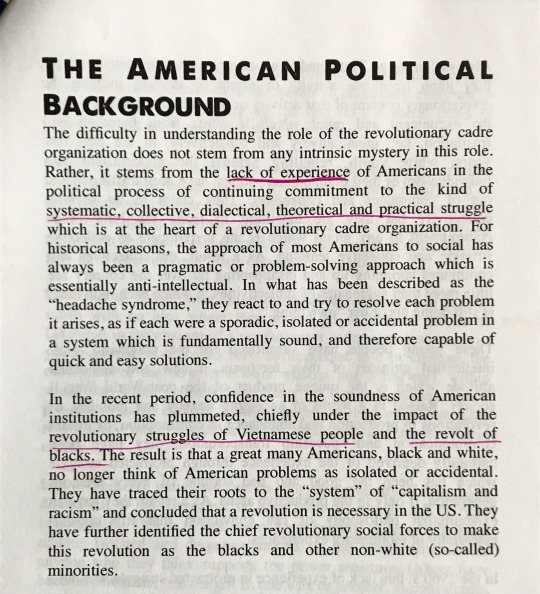
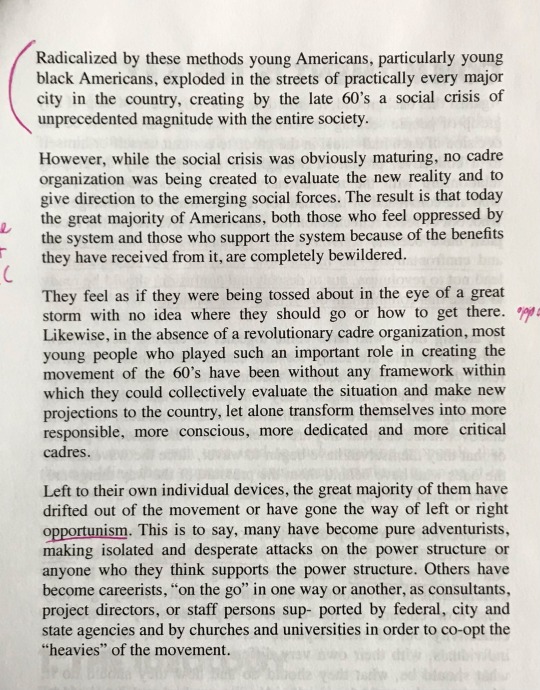
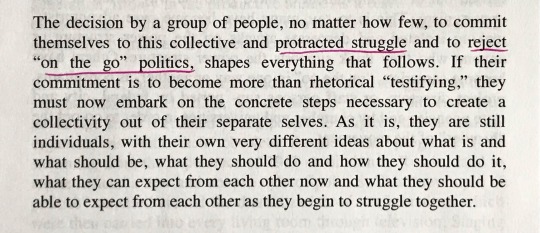
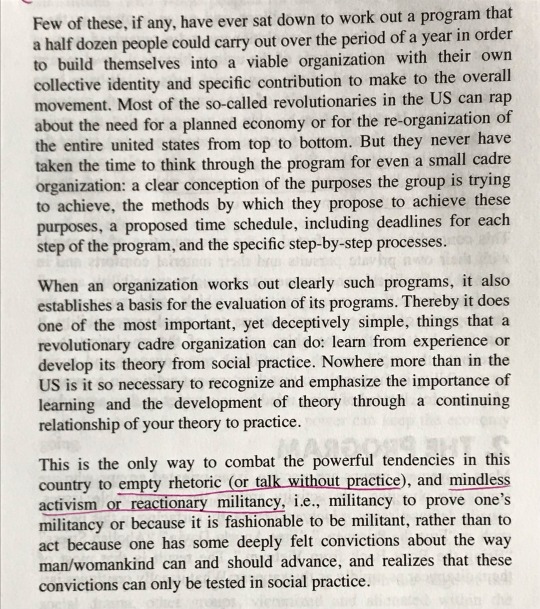
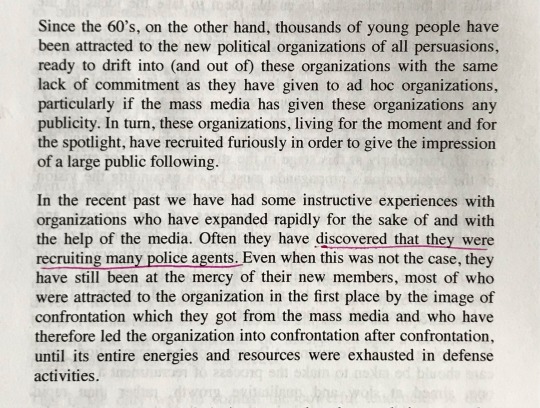
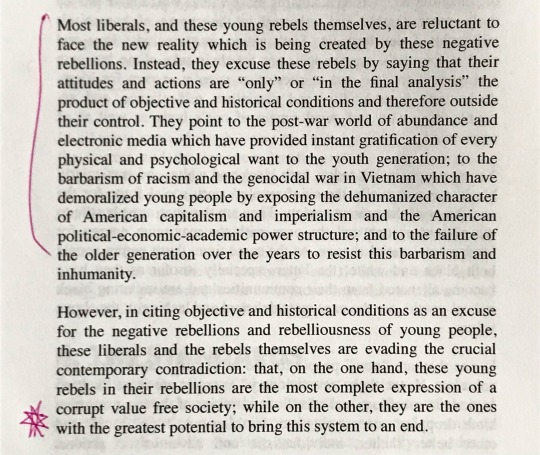
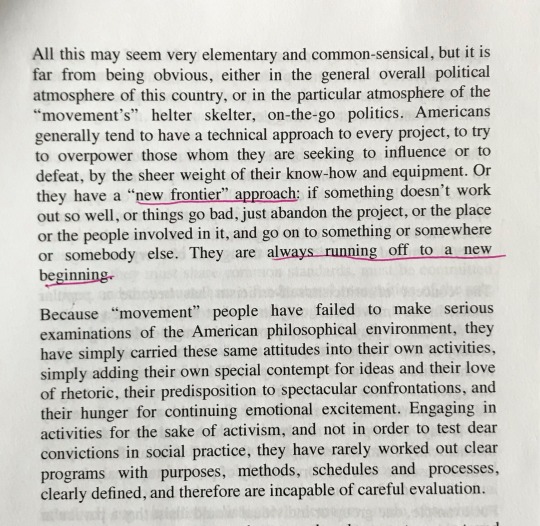
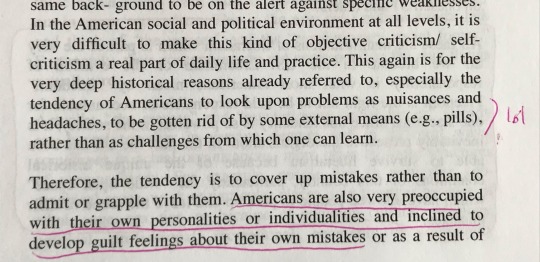
from grace lee boggs “organizing means commitment” 1972
75 notes
·
View notes
Text
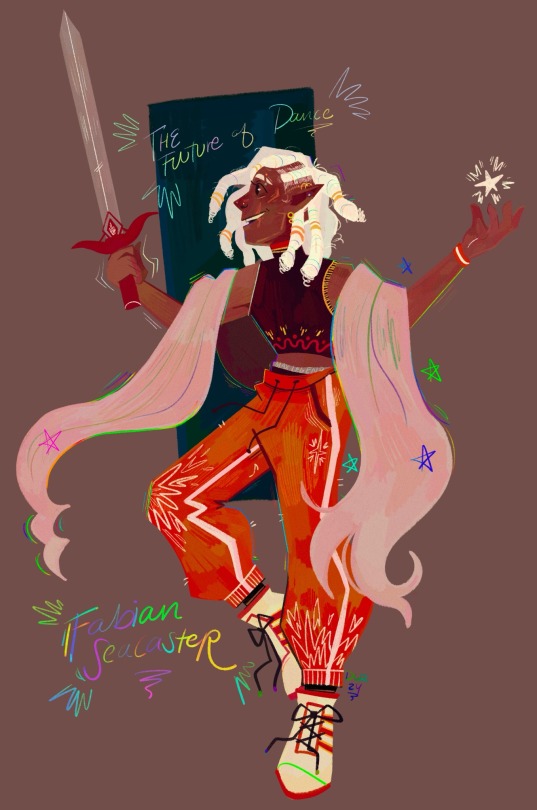
THE FUTURE OF DANCE!
698 notes
·
View notes
Text
post-post clarity when you're looking at your post on the dash like who gives a fuck. delete
33K notes
·
View notes
Text
it's so funny when dudes are like all appalled by the idea of a girlfriend/partner having an onlyfans. like aahhh now everyone knows my wife is hot
5K notes
·
View notes
Text
posts where someone smugly talks about "online vs offline discourse" are ridiculous and nonsensical even if i agree with the op's opinion on the actual argument because without fail what it translates to is: offline, the op only knows and interact with people who agree with them about the topic, because this is how they have curated their social sphere. online, where people are exposed to posts by hundreds or thousands of different people on a regular basis, they see more posts from people they disagree with simply based on a much larger sample size with less curation. because they do not personally/irl know anyone with the same beliefs that they see espoused online, they act as if the individuals with those beliefs aren't also real people who exist in real life. It's dumb as hell.
2K notes
·
View notes
Text
I am so fucking scared. I feel that... you know it's not about death. I'm not so scared of death. I'm so scared of being displaced. I want to go back to my home--and I'm so near, by the way... Gaza is so small. But I can't go there because the Gaza Strip is cut into pieces, and vehicles and tanks are in the borders between these pieces so I just can't go anywhere inside my homeland. My place. And... it's unacceptable. It's unimaginable. You know I have never imagined before that one day someone would just grab me from my... my homeland. My place. And just throw me away and prevent me to come back.
By the way, we don't know if we could go back. If we could go back again. Ever. And I'm so scared that they could displace us from Gaza Strip to the desert. [Bisan's voice breaks, she breaks into tears] We will die in the desert because of hunger. They displaced us to Egypt. To the north of Egypt, to Sanari desert. People just die. We will die.
[Sob] I don't know why do you guys are watching without doing anything to end this. Just in the... just stop it. Just stop it. Stop it in any price, stop it in any cost. Just stop it for anything. Just stop this. It's a nightmare. I can't continue just thinking about the displacement more and more. It's a nightmare. And I can't-- I can't keep it alive while thinking of being displaced more and more.
I just wanna go back to my home.
-- Bisan in a heartbreaking voice memo on Instagram, 2.14.2024
21K notes
·
View notes


